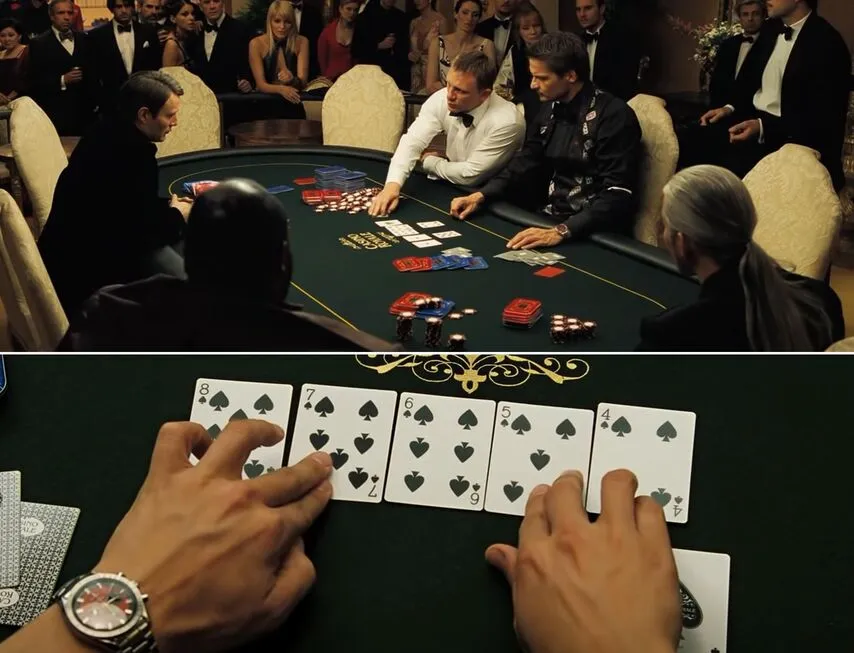Have you ever tried to explain poker to someone who’s never played?
Whether the game is a beloved hobby or income source, you eventually need to tell friends, family, and of course, romantic interests.
Some audiences are receptive and might even know a thing or two about the game. They’ll listen to your tips and nod in agreement as you compare poker to chess. These listeners understand that you’re describing a game of skill and strategy.

But then, there’s the other crowd.
To this group, the tales of bet sizes and hand ranges are nothing more than a gambler’s superstitions. They nod as you explain poker, but you’ve already been categorized as a casino-goer, spinning the wheel or praying for blackjack.
If you’ve chatted about poker with the uninitiated, one of these phrases might have popped up.
“Isn’t poker just gambling?”
For many people outside of poker, the game shares the same space with roulette, blackjack, and slots. Poker is in the casino, so, it must be just another gambling game.
But of course, we know that poker is the only casino game where players compete against players. In all other games, the house competes directly against players, in the most optimized ways.
Hollywood hasn’t helped the game shake this stigma. Even in one of the most realistic movies, Rounders, genius folds and one-of-a-kind coolers take center stage.

For many of those who don’t play poker, James Bond in Casino Royale is their one and only reference. It paints poker in a ludicrous light (but it’s still entertaining).
You could let them know that even Magnus Carlsen plays poker, or Neymar Jr. if they're football fans.
“Poker is all about luck.”
The idea that winners must always have the best poker hand is tough for some people to shake. The movies are partially to blame, but bluffing is also tough to grasp. You’ve got to remember that our friends and family don’t understand hand ranges. To them, poker hands are either strong winning combinations or unplayable weak ones.
“You either have it or you don’t” is a concept that still sticks with players long after learning poker. It gets reinforced after every cooler and “setup” hand. Luck is an explanation that seems to fit nicely when things don’t go our way.
The difference between variance and luck is one of the toughest things to explain. There is a relatively simple way to demonstrate this though. After playing 10,000 hands online and seeing the EV graph, they’ll understand.
“Isn’t poker a game, not a job?”
Cards give the impression that poker is just another game, like Go Fish, Uno, or Pokemon perhaps. Yes, it’s a game, but also a source of income for many. Also, your income almost always rises in relation to your skill, just like a job.
Poker also has plenty of differences from the average game:
- A huge amount of poker players compete for money, rather than just fun.
- Poker incorporates math, logic, emotional intelligence, and other strategic elements.
- You can play against thousands of different opponents around the world, at any time.
- There are longer multi-table tournaments or cash games that you can leave anytime.
- Poker comes in various formats with overlapping concepts (Holdem, Omaha, Razz, etc).
On top of this, poker is a recognized mind sport. Still, the proof is in the pay stubs for lots of the people you tell about poker. As many professionals have said, money seemed to evaporate many of their family's concerns.
“I heard online poker is rigged.”
It’s important to remember that almost every game has been rigged at some point. This is not poker-exclusive. Cheaters have tried to rig professional sports, casino table games, slot machines, and maybe even your game of Monopoly once or twice (we’re not saying it was you).
So, if cheating will always threaten every game, what matters is our approach. For online poker, the room’s security team focuses on preventing this. This means that choosing an online poker room with a solid reputation is the best way to avoid unfair games. For live games, well-established casinos are the safest.
Or, you could host completely private games with your friends, at personal online tables.
- Increased first deposit bonus
- Increased rakeback and reloads
- Help with deposits and cashouts
- Access to private freerolls
- Round-the-clock support
“How much have you lost playing poker?”
This question often comes from family members and dates. Some ask out of concern for your bankroll, while the minds of others naturally drift to the negative places. Like fast-forwarding to the crash in a NASCAR race, some people will ask about your losses right away. Never mind how much you’ve won – they’d like to hear about the downsides first.
This is an extension of poker’s gambling stigma. All gamblers must be losing money, and so should you, by extension.
However, numbers always paint a clear picture. If you’re comfortable, you could share your profits (or lack of) and explain them.

“Are you addicted to gambling?”
Poker players often sit grinding for long sessions, rubbing shoulders with the casino crowd or multi-tabling at home. To an outsider who doesn’t understand the game, this shares too many similarities with a gambling addict.
This game also ignites fears for people who care about your well-being, but don’t understand the game entirely. Even if you’ve done your best, poker may still sit beside slots and roulette in their mind. The money at play only increases their worry, a feeling only quelled by one thing.
As with most of the phrases on this list, information dispels misconceptions. If you’re committed to this game, an open discussion is crucial. It’s not always easy to explain but do your best (and don’t bluff).
One of our members, Pavel, had a different way of explaining things to new dates from Tinder:
I tell them that thanks to poker I can live in any country in the world, that I don't have a forced team and I choose the people with whom I communicate. Then I add that I play pretty well and she can read about me on the Internet, my nickname is LLinusLLove.
Unfortunately, he isn't LLinusLLove, but he is funny.










